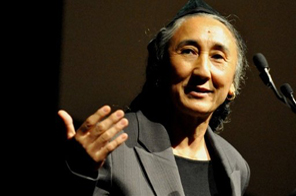Kadeer alleges prisoners killed
WASHINGTON: Rebiya Kadeer, the leader of China's Uighur minority in exile, has highlighted a report that nearly 200 inmates were "tortured" to death in prison.
The allegations came as a war of words intensifies between Beijing and the 62-year-old former businesswoman. China has accused her of instigating recent unrest in northwestern Xinjiang region, charges she adamantly denies.
Kadeer, who lives in the Washington area, said Monday she received a fax from a Uighur policeman who fled to nearby Kyrgyzstan and gave a grim account of Urumbay prison south of the city of Urumqi.
The policeman said that 196 Uighurs detained in a clampdown in the region "were tortured and killed" at the detention center, according to Kadeer.
"One of the Uighurs, named Erkin, couldn't stand the torture and killed himself," she said during a recording of a segment on the current affairs cable network C-Span about her memoir, "Dragon Fighter," which was published in May.
Kadeer, leader of the World Uighur Congress, said it was impossible to verify the account as phone lines had been cut.
"I'm sure that as soon as this is made public, China will say that it's not true," she said. "We cannot prove it because everything is down." China's worst ethnic violence in decades broke out on July 5 in Urumqi, pitting Han Chinese against Uighurs, a Turkic-speaking and predominantly Muslim people. At least 197 people died, according to official figures.
Kadeer scoffed at China's announcement that it would put more than 200 people on trial over the unrest.
"I believe it's another sham to deceive the world about what's actually going on behind closed doors," said Kadeer, who spent some six years in a Chinese prison before her release under US pressure in 2005.
"The Chinese government already decides the lawyers who are going to 'defend' the Uighurs," she said. "If these lawyers do not act the way that the Chinese government expects them to, they will suffer the same fate as those being tried." Kadeer voiced appreciation for the receptions she received on recent visits to Japan and Australia, which came despite Chinese pressure to block her entry. She said she was startled at the number of reporters who showed up to her news conference in Australia.
"I have never been hopeless in my life," said the mother of 11. "I believe that democratic societies will not just watch this happen, because our movement is peaceful." China on Saturday freed high-profile activists in a sudden move that came shortly after the new US ambassador, Jon Huntsman, arrived in Beijing and said that President Barack Obama would visit in November.
One freed activist was Ilham Tohti, a Beijing-based academic who was apparently detained over his website Uighur Online, which included writings on the unrest in Xinjiang.
In an interview with Radio Free Asia, Tohti said that police knocked on his door late Monday to warn him against speaking out about how the violence was handled.
"They told me I could soon be sentenced -- be sentenced to death, be 'dealt with,'" Tohti said.
The Uighur activist said he was detained partly at his home but for two weeks was held at a hotel.
The police were "courteous" and "civilised," Tohti said, but grilled him endlessly at the hotel, where he spent more than 20 hours a day with three or four policemen.
"I was unable to tell day from night. My head was spinning," he said.






